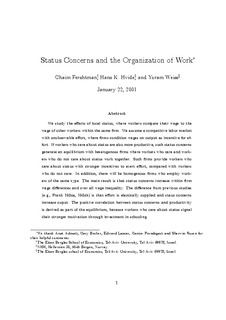Status concerns and the organization of work
Working paper

View/
Date
2001-01Metadata
Show full item recordCollections
- Discussion papers (FOR) [566]
Abstract
We study the effects of local status, where workers compare their wage to the wage of other workers within the same firm. We assume a competitive labor market with unobservable effort, where firms condition wages on output as incentive for effort. If workers who care about status are also more productive, such status concerns generate an equilibrium with heterogenous firms where workers who care and workers who do not care about status work together. Such firms provide workers who care about status with stronger incentives to exert effort, compared with workers who do not care. In addition, there will be homogenous firms who employ workers of the same type. The main result is that status concerns increase within firm wage differences and over all wage inequality. The difference from previous studies (e.g., Frank 1984a, 1984b) is that effort is elastically supplied and status concerns increase output. The positive correlation between status concerns and productivity is derived as part of the equilibrium, because workers who care about status signal their stronger motivation through investment in schooling.
Publisher
Norwegian School of Economics and Business Administration. Department of Finance and Management ScienceSeries
Discussion paper2001:1